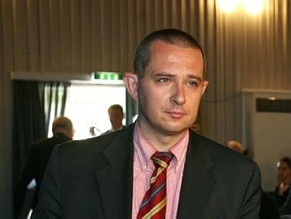|
World Jewish News

The head of the Central Council of Jews in Germany insisted the views advocated by Secretary General Stephan Kramer “do not reflect the official line represented by the Central Council of Jews”,
|
Central Council of German Jews leadership divided over position on outlawing neo-Nazi political party
20.02.2013 The leadership of the Central Council of Jews in Germany found itself embroiled in a dispute last week, after President Dieter Graumann was forced to issue a statement disassociating the organisation from comments made by its Secretary General Stephan Kramer to a local newspaper opposing the group’s long-stated goal of banning the country’s extreme-right National Democratic Party (NPD).
After Kramer’s insistence last Wednesday that it was impossible to “prohibit (neo-Nazi ideas, you can only ban them”, Graumann responded that the council “remains resolutely in favour of banning the NPD party”.
Insisting the views advocated by Kramer “do not reflect the official line represented by the Central Council of Jews”, the vehement statement concluded that it was its belief that the group should have been outlawed “long ago”, as it pledged to continue to lobby the Bundestag (German parliament) and the federal government” to pursue such a course of action. Graumann further objected to the group’s continued receipt of tax funds to enable its controversial activities, which in line with German law gifts it approximately €1.3 million annually.
Defending his comments to German media in the aftermath of the widely-reported controversy, Kramer insisted that whilst the council maintained its official party line on the issue, “as a citizen of this country I allow myself to have a different personal opinion”.
However, the comments appear to represented a rather marked departure from his previously-stated views, as an undated article by Kramer written for the German ddp news agency and posted to the council’s website described NPD members as “wolves in sheep’s clothing pretending to be committed to solving various economic and social problems”. Such self-proclaimed democrats, he insisted have the shared goal of reviving Nazism. Despite conceding that far-right and neo-Nazi ideology couldn’t be combated equivocally by a ban, he added that legal as well as political tools were needed to fight the threat posed by such groups.
“While bans rather compromise the fundamentals of our open society than help to fight Neo-Nazism effectively, we have now arrived at a situation where our democratic rule-of-law state has to take measures to protect itself. To achieve this the state can, as ultima ratio, use its right to ban parties laid out in article 21 of the Basic Law,” he concluded.
This isn’t the first hint of controversy in which Kramer has found himself involved, after he bucked international opposition from the Jewish community to last year’s attempts by a Cologne district court to ban the practice of religious circumcision by implying that the ancient practice could be modernised.
Last June, eight NPD party members were expelled from Germany’s state parliament for sporting a brand of t-shirts closely associated with the neo-Nazi movement, being forcibly removed by police after refusing to leave the chamber of their own accord.
The speaker of the assembly in Saxony, in formerly communist eastern Germany where NDP support is predominantly based, banned the seven men and one woman from the party after being alerted to the clothing by the Thor Steinar brand, which had previously been outlawed by the chamber in 2007, on account of its “Viking” and “Nordic” style slogans which have become closely interlinked with the neo-Nazi movement in Germany. Authentic Nazi clothing and memorabilia itself is illegal in the country.
The incident followed a violent NPD rally in Hamburg the previous month when a fracas broke as 4,000 counter protesters attempted to block a 700-strong neo-Nazi contingent of demonstrators. The violence resulted in the arrests of six neo-Nazis and 20 counter-protesters prompting Graumann to reissue calls to ban the group from its current position holding representation in two of Germany’s state parliaments.
The federal government previously tried to have the extremist party, described as “the most significant neo-Nazi party to emerge after 1945” in Germany, banned in 2001, but following the revelation that many high profile members were in fact undercover agents and informants for the German secret services, and the government’s subsequent unwillingness to reveal their identities and activities, the case was dismissed.
by: Shari Ryness
EJP
|
|
